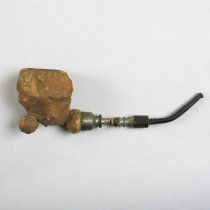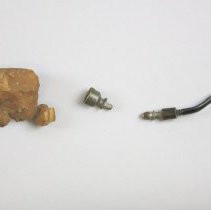Object Record
Images



Metadata
Object Name |
Pipe, Smoking |
Catalog Number |
1925.022.02 |
Description |
Colonel James Polleys' pipe. Pipe is in three separate pieces. A) The bowl of the pipe is made from a root, possibly bamboo and is brown. The bowl has two nodes, one node has been threaded and connects the shank. B) The threaded metal piece that connects the stem to the bowl. Silver colored metal piece with threads on one side and a tapered off connector on the other side. C) Stem of the pipe. The lower end is a silver colored metal connector. In the center there is a saddle coupling the connector and the bit of the pipe. The bit is black and curved at a 45 degree angle. |
Year Range from |
1860 |
Year Range to |
1890 |
Provenance |
This pipe belonged to Colonel James Polleys. |
Owned By |
Colonel James Polleys |
Material |
Root, Metal |
Dimensions |
L-7.5 inches |
Length (in) |
7.500 |
People |
Polleys, James W. |
Subjects |
"Things that Matter" |
Search Terms |
"Things that Matter" |
Notes |
Featured in Things that Matter This pipe is admittedly not the prettiest thing to look at. The Historical Society had to put it back together when we found it. There’s a piece in the middle missing. The bowl of the pipe — made out of a root, possibly bamboo — is an unflattering shade of brown and looks like a misshapen lump. However, just because something isn’t pretty doesn’t mean that it isn’t interesting. This pipe once belonged to Col. James Polleys, a Civil War veteran and one of La Crosse’s early sheriffs. Polleys was born in Nova Scotia in 1825. At age 18, he moved to Maine to work at a lumber camp before marrying his first wife, Margaret Huff. The couple eventually made their way to La Crosse, where James worked as a stonemason before being elected sheriff in 1853. He won re-election in 1857. Being sheriff at that time could not have been easy, as the town only became officially incorporated within its present limits in 1856. Before then, with few laws and little enforcement, people were used to settling disputes on their own. When two parties came into conflict, firearms and fisticuffs could easily become involved. In 1859, in the midst of a trial over a property dispute, the defendant made a disparaging remark about the plaintiff. The plaintiff responded by accusing the man of lying about the terms of a land contract. The defendant punched the plaintiff in the face, knocking him to the floor. A wild fight ensued, and the judge ordered Sheriff Polleys to "remove the men to an open field where they can have a free fight." Breaking up fist fights in a small town courthouse was only the beginning, though, as the U.S. was about to have a knock-down, drag-out of its own. In 1861, Polleys enlisted in the U.S. Army and received his commission as captain of Company D of the 14th Regiment of the Wisconsin Infantry. He served through the entire Civil War, at one point fighting under Gen. Ulysses S. Grant at Vicksburg. He was promoted to colonel after distinguishing himself during the Battle of Shiloh. Polleys only sustained one injury, when a cannon ball struck a nearby tree and sent a large splinter into his leg. After the war, Polleys returned to La Crosse and was re-elected sheriff in 1867. A few years later, he retired to Wells, Minn. He died after suffering a stroke in 1896. This article was originally published in the La Crosse Tribune. Title: Col. Polley's Pipe Author: Claire Trussoni Publish Date: August 18, 2018 |